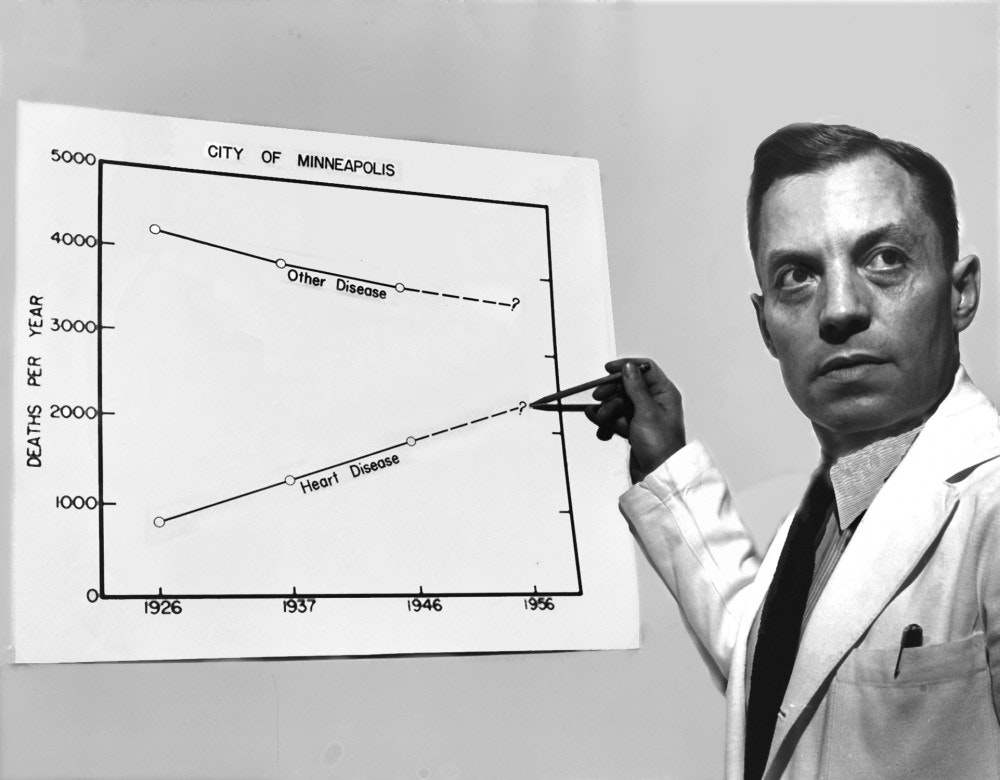To understand how low-fat (and sometimes sugar-laden) products have filled our supermarket shelves, we need to go back to Ancel Keys' theses.
Table of contents
HideFind out more about this chapter in the ideal diet for mankind in PODCAST format:
Ancel Keys is an American researcher who, in the 1950s, launched the hypothesis that diet is the cause of cardiovascular disease.
In 1956, the famous nutritionist launched what would become a quasi-biblical reference in the field of nutrition: the 7 countries study. Keys had launched this study to prove that excessive consumption of fats was indeed the cause of cardiovascular disease.

For Ancel Keys, the fats and cholesterol were likely to clog arteries. To prove this, he studied the link between consumption of saturated fats, such as butter, and cardiovascular mortality in 7 population groups.
This content is part of the guide Blooness, the guide to the ideal human diet, the summary of which you can find here 🌱🥑
The study involved over 12,000 men in the USA, Finland, the Netherlands, Italy, Yugoslavia, Greece and Japan. Ancel Keys shows that Finland has a high rate of cardiovascular disease, while Finns are high consumers of saturated fats.
Conversely, Greeks and Japanese have a lower incidence of heart attacks, and consume little fat. The nutritionist establishes a correlation between fat consumption and the rate of cardiovascular disease.
French-speaking subscribers will receive the newsletter in French, and all others will receive an English version.
The problem is that Ancel Keys deliberately chose these 7 countries, because they corroborated his initial hypothesis, whereas if he had chosen other countries, say Israel, the Netherlands, Germany, Switzerland, France (and its famous "French paradox") or Sweden, the study would have suggested the opposite.
In fact, France, Germany and Switzerland had low rates of cardiovascular disease, even though their populations consumed a lot of saturated fats.
The International Foundation for Sugar Research - the famous lobby set up by the sugar industry - called on several experts close to Keys' theses, including Francisco Grande, nutritionist William Connor, and above all Edwin Biermana diabetes expert from the University of Washington. He has convinced the American Association of Diabetologists not to restrict the amount of carbohydrates recommended for diabetics, and co-authored a report by the National Diabetes Commission in 1976 that influenced research programs on the disease, and included scientific studies funded by the sugar industry.
Posterity has proven that Ancel Keys' 25-year study of the 7 countries was unfortunately flawed.. But at the time, these anomalies didn't stop US Senator George McGovern from publishing the "Food Goals for the United States", based in particular on this study.
Thus, in 1977, under the influence of Ancel Keys' work, American nutritional recommendations advocated :
- 60% of calories in the form of mainly slow sugars (including a large proportion of cereals)
- A reduction in lipids from 20 to 30%
France will follow this path, and to date, this distribution has only changed slightly.
And yet, with hindsight, obesity has skyrocketed worldwide since the late 70s, and cardiovascular disease and diabetes have since taken on alarming dimensions.
Between 1980 and 2010, the percentage of obese people in the US will more than double, rising from just over 10% to over 35.7% of the US population.
John Yudkin's prophetic book
In 1972, with the publication of his book Pure, White and Deadly, John Yudkin was the first scientist to blame sugar rather than fat to be one of the main threats to our health. His book, which contradicted the dominant discourse spearheaded by Ancel Keys, provoked strong reactions and criticism from both the food industry - led by the Sugar Association - and the research community.
His study was ridiculed and his reputation destroyed, so much so that for a long time the book was almost impossible to find. a certain Robert Lustig, a pediatrician and endocrinologist at the University of California, brought his theses up to date..
Next chapter: an agro-industrial conspiracy?
Previous chapter: The birth of the sugar lobby

2 Responses